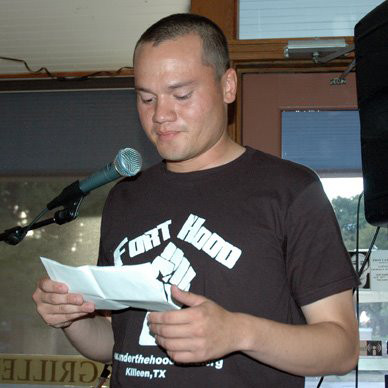Suicides in the US Army rose to a new record in 2009, with 160 soldiers taking their lives, the military said Friday, calling it a "painful year."

Associated Press, Aug. 6, 2009: A Fort Hood soldier who refused to deploy to Afghanistan over his beliefs that the war violates international law was sentenced Wednesday to a month in jail. The judge also reduced his rank to the Army's lowest level, a private. After the sentence was announced, Agosto immediately ripped the rank patch from his uniform. He later was escorted out of the building and taken to the county jail, where he will start serving his sentence. A discharge was not mentioned in the hearing, but Agosto is expected to be released from the Army after completing his jail term.
Army leaders had warned that the suicide rate was on track to surpass last year's toll of 140, but said the causes of the spike remain unclear.
"There's no question that 2009 was a painful year for the army when it came to suicides," said Colonel Christopher Philbrick, deputy director of an army suicide prevention task force.
Ten suspected cases of suicide in December for active-duty soldiers brought the total number for last year to 160, the Pentagon said in a statement.
The army has come under severe strain from years of war in Iraq and Afghanistan, with officers citing repeated deployments and the stress of combat as fuelling an increase in depression and marital problems.
But the grim toll of suicides was not necessarily triggered by repeated combat tours in Afghanistan and Iraq, according to the military's own research.
The causes appeared to vary from base to base and about one-third of the soldiers who committed suicide had not yet deployed to combat missions in Afghanistan or Iraq, officials say.
Top military leaders, including the chairman of the Joint Chiefs of Staff, Admiral Mike Mullen, have appealed to officers to ensure soldiers who need psychological help do not face ridicule or risk to their careers.
The army has adopted a range of initiatives to try to contain the problem, hiring hundreds of mental health specialists and launching an elaborate scientific research project to try to understand the trend.
Officials have also expressed concern about suicides among veterans and among military spouses and family members.
Admiral Mullen's wife, Deborah Mullen, told a conference this week that more needed to be done to monitor suicides of spouses and members of military families, something the Pentagon does not track precisely.
Often the spouses of service members are reluctant to seek help as they fear it could damage their loved one's career prospects, she said.



